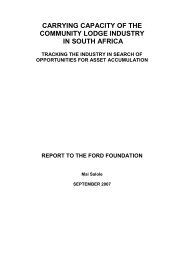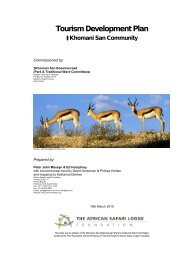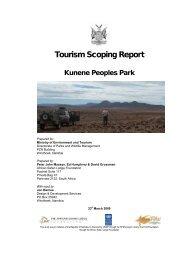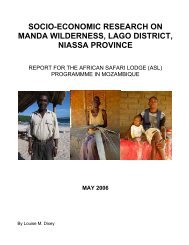Evaluating outcomes at Madikwe and Makuleke by Peter John Massyn
Evaluating outcomes at Madikwe and Makuleke by Peter John Massyn
Evaluating outcomes at Madikwe and Makuleke by Peter John Massyn
Create successful ePaper yourself
Turn your PDF publications into a flip-book with our unique Google optimized e-Paper software.
A word of caution is perhaps appropri<strong>at</strong>e here. It is often argued th<strong>at</strong> the sectoral<strong>at</strong>tributes of the tourism industry cre<strong>at</strong>e significant risks for the sustainability – or indeedthe achievability – of high levels of community benefit. Tourism generally, <strong>and</strong> n<strong>at</strong>uretourism specifically, is a large <strong>and</strong> highly competitive global industry with complexlinkages <strong>at</strong> the local, n<strong>at</strong>ional, regional <strong>and</strong> intern<strong>at</strong>ional scales where supply <strong>and</strong> dem<strong>and</strong>conditions are often shaped <strong>by</strong> external factors beyond the control of local actors. 16This is undoubtedly true, <strong>and</strong> there are many instances where the industry – <strong>and</strong> localbenefit with it – has suffered due to events beyond the tourism sites. The recent nearcollapse of tourism in Zimbabwe is a southern African case in point. Even in <strong>Madikwe</strong>, therobust commercialis<strong>at</strong>ion approach of the NWPTB has cre<strong>at</strong>ed a rapid expansion in supplyof beds th<strong>at</strong> has led to cut-thro<strong>at</strong> conditions with a large number of new entrantscompeting aggressively for market share. Under such circumstances, a lodge like BuffaloRidge faced severe competitive pressures <strong>and</strong> fell somewh<strong>at</strong> short in delivery of economicbenefits during its establishment phase. (These pressures are likely to be especially acutein the short term as <strong>Madikwe</strong> struggles to emerge as a regional destin<strong>at</strong>ion capable of<strong>at</strong>tracting sufficient market share.) But this is not in my view a reason to eschewparticip<strong>at</strong>ion in the tourism market. It is doubtful whether the risks flowing from thefluctu<strong>at</strong>ions <strong>and</strong> uncertainties of tourism are in fact gre<strong>at</strong>er than those associ<strong>at</strong>ed withother global industries (such as mining or agriculture) or indeed subsistence str<strong>at</strong>egiesth<strong>at</strong> often make poor households heavily reliant on n<strong>at</strong>ure (which can fluctu<strong>at</strong>e <strong>at</strong> least asmuch as, <strong>and</strong> often with worse consequences than, the market).Wh<strong>at</strong>ever the case, it is clear th<strong>at</strong> the rural poor are inherently vulnerably. Tourism – likeother sectors on which the poor rely – faces real risks which should be factored into theoverall livelihood str<strong>at</strong>egy of poor rural communities as they integr<strong>at</strong>e into this particularmarket. Having recognised the risks, it is however also clear th<strong>at</strong> particip<strong>at</strong>ion in thetourism industry holds gre<strong>at</strong> potential for the economic advancement of the poor providedthe industry’s specific risk profile is understood <strong>and</strong> appropri<strong>at</strong>e mitig<strong>at</strong>ory measures areput in place. This is a complex argument which is beyond the scope of the current paper.Suffice it to say th<strong>at</strong> the arrangements <strong>at</strong> Buffalo Ridge <strong>and</strong> Thakadu were designed withthis in mind: the very decision to contract the services of a well-endowed <strong>and</strong> provenpartner was rooted in an underst<strong>and</strong>ing th<strong>at</strong> the competitive conditions of the high valuetourism market require oper<strong>at</strong>ing <strong>and</strong> marketing resources far beyond the capabilities of agroup of rural residents. Given this partnership, the community-owned lodges in Madikewappear to be rel<strong>at</strong>ively well positioned to we<strong>at</strong>her the storms of competition <strong>and</strong> to deliverthe economic benefits sketched above, especially under the new arrangements sketchedabove.16 See, for example, Turner, 2004: 6 – 9./14
















